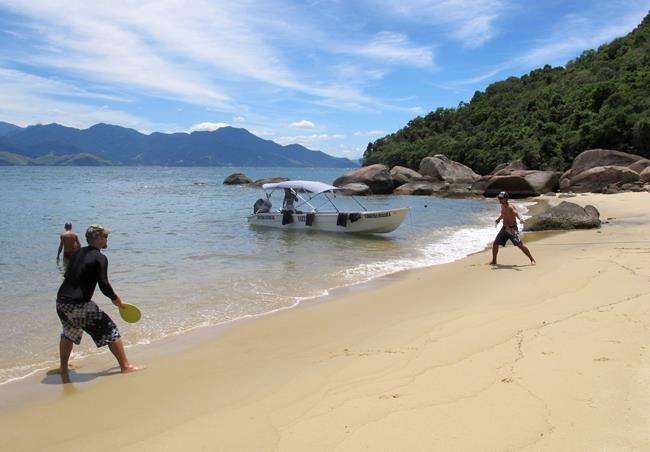
In this Feb. 12, 2017 photo, men play paddle ball on one of the many beaches of Ilha Grande, Brazil. The tropical island remains pristine in large because of an unusual history that includes being a pirate refuge, leper colony and site of a major prison. Still, there are worries about the future as its focus goes from fishing to tourism. (AP Photo/Peter Prengaman)
May 01, 2017 - 11:40 PM
VILA DO ABRAAO, Brazil - One of the first things visitors will notice about Ilha Grande, or Big Island, is that there are no vehicles. The local government prohibits private cars, maintaining the laid-back rhythms that islanders say are central to their identity.
Dirt and sand paths that run parallel to the many beaches, however, often do have travellers: scores of crabs scurrying across at a leisurely pace that only picks up if a human approaches.
"Life here is simple," said Rodison Marcos, a 48-year-old boat operator born and raised here. "We don't need a watch, or a tie or cars."
For foreign and Brazilian tourists alike, that slowed development means this tropical island can offer something Rio de Janeiro and surrounding areas have not been able to for years: clean beaches. Ultimately it was a search for unsullied ocean, where my wife and I would feel comfortable letting our three young sons swim, that attracted us.
The island is a three-hour trip from Rio, but no highway or bridge connects it to the mainland. Several boats a day traverse a small stretch of sea from three different ports. The relative isolation means cellphone service is spotty, and Internet often feels nonexistent. In short, it's a place to disconnect while feeling strong connections because everybody appears to know everybody.
"Oh, you are going to the place of Alex, the French guy," a man told me after we arrived in Abraao and asked directions to Bica Beach. "Let me get you a taxi boat."
Our Airbnb bungalow was another 10 minutes away by wobbly motorboat. Then we climbed the equivalent of six flights of stairs on a steep path through lush tropical forest. All the huffing and puffing and sweating felt worth it once there. Looking down, we saw blue ocean waters while monkeys jumped between trees.
The island, about 77 square miles (200 square kilometres), is pristine in large part because of an unusual history going back to the 16th century Portuguese colonization. It has been a pirates' lair, a leper colony and most recently, home to a maximum security penitentiary that housed some of Brazil's most violent criminals, along with political prisoners during part of the 1964-1985 dictatorship.
Various rebellions and headline-grabbing escapes created headaches for islanders and kept investors away. In 1994, however, the Candido Mendes prison was closed and demolished. A few years later, the State University of Rio de Janeiro opened a research centre to study the environment and sustainable development.
Today, there are numerous pousadas, or guest houses, in Vila do Abraao, which has about 3,000 residents. There are also offbeat places to stay, from beachfront villas to isolated jungle dwellings. Companies offer excursions that range from some of Brazil's best snorkeling and scuba-diving to walking tours through rainforests teeming with life. Then there are the dozens and dozens of beaches that are both postcard-worthy and often empty.
"Look at this water," said Felipe Ricardo Brito, who sells caipirinhas, a mix of the national alcohol cachaca and limes, on Feiticeira Beach. "It's totally clean. There is no sewage. You can breathe pure air."
That is not the case on most beaches in and around Rio de Janeiro, the city that hosted the 2016 Summer Games. An 18-month investigation by The Associated Press during the run up to the Olympics found dangerously high levels of bacteria and viruses in Rio beaches. Only a little more than half of the sewage in Rio is treated, meaning that each day tons of fecal matter ends up in the Guanabara Bay and surrounding beaches.
Still, while Ilha Grande doesn't have a sewage problem, it's far from an environmental paradise. For example, amid a deep economic crisis in the country, the island has struggled with garbage collection.
Earlier this year, the island captured national headlines when hundreds of bags of garbage were strewn throughout Vila do Abraao. The local government switched garbage providers and has promised to regularize service. Still, the problem periodically pops up, irking islanders and creating eyesores. When we visited in February, crabs could be seen among the garbage.
There are also worries about overdevelopment. Much of the island is protected wildland, but Brazil has a history of big money interests winning out against environmental protections. Last year, the environmental secretary of the state government invited Ilha Grande residents to present ideas about the future, from development projects to environmental issues. While billed as a way to build consensus, many residents were suspicious that it was really just a precursor to ramming through big changes.
As the island opens up, its industries and demographics are changing. While fishing is still a central industry for many residents, increasingly fishing and crab boats are used to ferry around tourists. And some tourists like it so much that they are finding ways to stay.
"Now there are Argentines, Brazilians from other states and hippies living here," said Selma dos Santos Garcia, a 34-year-old Ilha Grande native who sells snacks on the beaches. "And we are at the mercy of tourists."
___
If You Go...
ILHA GRANDE: http://www.visitbrasil.com/en/destinos/ilha-grande/ . When choosing lodging, remember that you must walk or take taxi boats to all accommodations outside Vila do Abraao.
___
Peter Prengaman is The Associated Press news director for Brazil, based in Rio de Janeiro. Follow him on Twitter: twitter.com/peterprengaman.
News from © The Associated Press, 2017